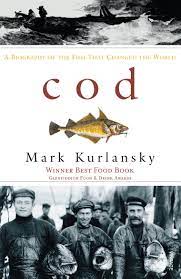Cod: A Biography of the Fish That Changed the World
For the category Wild Animals of the 2022 NONFICTION READER CHALLENGE, I chose Cod, by Mark Kurlansky, 1999.
The
sub-heading of the book attracted me. I’ve read a number of non-fiction books
about an item that ‘changed the world,’ such as coal, cotton and cement. I
understand there is also a book about figs that claims the same thing. For some
reason, I find such minute histories to be extremely interesting. Although I
felt there was not enough support for how the codfish changed the world, I
learned more information about the fish and the fishing industry than I ever
thought I would know.
This
book was the winner of the Glenfiddich Food & Drink Awards as the Special
Award Food Book 1999. I hadn’t known about that award, but it turns out that I
had read one of the winning books (Toast:
The story of a boy’s hunger, by Nigel Slater). However, it was discontinued
in 2008. I also like reading about the history of foods, for some reason. Even
if they were not claimed to have changed the world, they are interesting
nevertheless. For example: olive oil (see my book review of March 08, 2021), bagels (posted on August 09, 2021), chocolate,
tea, olives, bere (Orkney’s ancient grain) as well as a book with chapters
about beer, wine, spirits, coffee,
tea, and Coca-Cola.
I have had a personal
relationship to cod. I lived in Portugal for a few years and dried cod was used
in so many dishes there, it was hard to keep track. It was also the dish of
choice for special occasions, like Christmas dinner. Cod is not native to the
Atlantic coast of Portugal, but Portuguese fishermen sailed to the eastern coast
of Canada for 6 months to fish for the cod and then dried it on the ship. It
amazed me that the ‘national dish’ of the country doesn’t come from that
country. But it was clear that cod has had a great impact on Portugal’s
economy, social life and cuisine.
Kurlansky often
refers to how the cod industry had a great influence on other areas and on the
business world. For example,
“By the eighteenth century, cod had lifted New
England from a distant colony of starving settlers to an international
commercial power. Massachusetts had elevated cod from commodity to fetish.”
The book is
organized by time periods and by locations. Part One covers the history of cod
from medieval times to the American Revolution in 6 chapters. It also includes
the changes of the different types of fishing vessels through time. Part Two
focuses on aspects of the fish itself (how it lives, breeds and is caught), on
fisheries, and how, eventually, the amount of cod available in the oceans was
depleted. The final part details how the reduction of the cod-fishing industry
has affected the areas of the world that were most involved in it.
In fact, the last
sentence in the book is a rather depressing summation of the depletion of cod
(and other fish):
“We were forced
to give up commercial hunting and to raise domestic mammals for meat,
preserving the wild ones as best we could. It is harder to kill off fish than
mammals. But after 1,000 years of hunting the Atlantic cod, we know that it can
be done.”
In
all of the chapters, the information is very detailed, but the changes in the
world were concentrated in a few European countries and in North America. The
cod-fishing industry definitely had an impact on the economy and social life of
these countries, but not on the rest of the world (except, I assume, on the
availability of the product).
Kurlansky covers
many ways that cod-fishing made a difference to economies, battles and history.
For example, in chapter 6, A Cod War
Heard ‘Round the World, he details the different measures Britain took to
tax the American colonies, and they included ones on both cod fishing and on
the number of fishing vessels. This added to the grievances the colonists had,
but it wasn’t the only one. So it didn’t convince me that the restriction on
cod fishing was a major cause of the American Revolution.
One person in the
book did seem to ‘change the world,’ however. In a chapter from the section on
the fish business, there is information about Clarence Birdseye, who I have
read about before.
“With few people
noticing, the next idea that would change North Atlantic fishing forever was
being contemplated by a somewhat eccentric New Yorker, passing the winter in
Labrador.”
Clarence
Birdseye, the eccentric New Yorker, developed a quick-drying process – first for
vegetables, then poultry, and then fish. He received the first patent on his
frozen food technology. So the availability of frozen food – so common in
supermarkets since then – has certainly changed the world, but it wasn’t
specifically about cod.
If I ignore that
the sub-title of this book is A Biography
of the Fish That Changed the World, then I would say it is a very interesting
history of the codfish, cod-fishing, fishing vessels, and the businesses that were created
related to them. It is written in a very accessible way, sometimes reading like
an adventure story. In some chapters Kurlansky included too much detail for my
taste, but he has obviously done a lot of research into all the areas he has
written about. The final section is a bibliography organized into the different
aspects of the topic.
A very nice touch
is that at the end of each chapter is a recipe from the area or time period
covered in that chapter. And the final section of the book, A Cook’s Tale: Six Centuries of Cod Recipes,
is a 41-page collection of further recipes.


Comments
Post a Comment